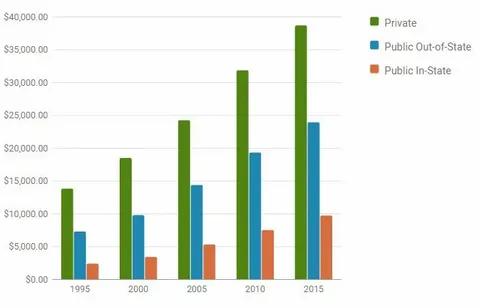Understanding Arizona State University Tuition for Out-of-State Students
Arizona State University (ASU) is one of the premier institutions in the United States, drawing students from across the globe. However, for students who do not reside in Arizona, understanding the tuition and associated costs is critical for financial planning. This article provides a comprehensive overview of ASU’s out-of-state tuition, fees, and strategies for managing these costs.
What is the Cost of Out-of-State Tuition at ASU?
For out-of-state students, tuition at Arizona State University is higher than for in-state residents. The approximate annual tuition for out-of-state undergraduates is around $30,000 to $40,000, depending on the program and campus. Graduate programs may have slightly different costs, often falling within a similar range. These figures do not include other expenses such as housing, meal plans, or personal expenses, which can significantly impact the overall cost of attendance.

Scholarships and Financial Aid for Out-of-State Students
ASU offers several options to help reduce the financial burden for non-resident students:
- Merit-Based Scholarships:
High-achieving students may qualify for scholarships such as the New American University Scholarship, which can significantly lower tuition costs. - Need-Based Aid:
Students demonstrating financial need can apply for grants, loans, and work-study opportunities through FAFSA. - External Scholarships:
Many private organizations and foundations provide scholarships to help cover the cost of attending ASU. - Special Tuition Programs:
ASU participates in programs like the Western Undergraduate Exchange (WUE), which offers reduced tuition rates to students from participating states.
Asu Polytechnic Campus
Arizona State University (ASU) Polytechnic Campus, located in Mesa, Arizona, is a hub of innovation, hands-on learning, and interdisciplinary collaboration. Known for its focus on engineering, technology, and applied sciences, this campus offers students a unique blend of academic rigor and practical experience. In this article, we’ll explore everything you need to know about ASU Polytechnic Campus, from its programs and facilities to student life and career opportunities.
Overview of ASU Polytechnic Campus
The ASU Polytechnic Campus is situated on a scenic 600-acre property in the vibrant city of Mesa. Designed with a focus on sustainability and functionality, the campus features state-of-the-art facilities, open spaces, and modern architecture. Its emphasis on experiential learning provides students with opportunities to engage in project-based coursework, research, and internships.
Career Opportunities and Industry Connections
ASU Polytechnic Campus maintains strong ties with local and national industries. Through internships, co-op programs, and partnerships, students gain valuable real-world experience. Notable industries that recruit from ASU Polytechnic Campus include aerospace, technology, and agribusiness sectors.
Arizona state scholarships
Arizona offers a variety of scholarships aimed at helping students achieve their educational goals. These scholarships cater to diverse needs, including academic excellence, financial need, and unique talents. From state-funded programs to private scholarships offered by local organizations, students in Arizona have numerous opportunities to reduce the cost of higher education.
Many awards are specifically designed for residents, promoting access to higher learning within the state. Whether you’re pursuing a degree at a community college or a university, Arizona’s scholarship options can make education more affordable and accessible.
AsuTuition cost
Arizona State University (ASU) offers a range of tuition rates depending on the program, residency status, and academic level. For in-state undergraduate students, tuition typically ranges between $11,000 to $12,000 annually, while out-of-state undergraduates can expect to pay between $29,000 to $32,000 annually. Graduate programs vary in cost, with in-state tuition averaging $11,000 to $15,000 per year and out-of-state tuition ranging from $23,000 to $29,000 annually.
Financial aid asu
Financial Aid at ASU: A Complete Guide to Funding Your Education
Arizona State University (ASU) offers a wide range of financial aid options to make higher education affordable for students from all backgrounds. From scholarships and grants to work-study programs and loans, ASU helps students reduce the cost of tuition and other expenses. Here’s an overview of the financial aid opportunities available at ASU and how to apply for them.
Types of Financial Aid at ASU
1. Scholarships
Scholarships are merit-based or need-based awards that do not need to be repaid. ASU offers:
- New American University Scholarship: Designed for high-achieving students, based on academic excellence.
- Private Donor Scholarships: Sponsored by external organizations and donors.
- Program-Specific Scholarships: Available for students enrolled in specific majors or programs.
2. Grants
Grants are need-based awards provided by federal, state, or institutional sources:
- Federal Pell Grant: For undergraduate students with significant financial need.
- Federal Supplemental Educational Opportunity Grant (FSEOG): For students with exceptional financial need.
- Arizona Leveraging Educational Assistance Partnership (AzLEAP): A state-funded grant for Arizona residents.

3. Work-Study Programs
ASU offers federal and institutional work-study opportunities, allowing students to earn money while gaining valuable work experience. Eligible students can work part-time on or off-campus to help cover educational costs.
4. Loans
Loans must be repaid with interest, but they can be a valuable resource for funding education:
- Federal Direct Subsidized Loans: For students with financial need; interest is covered by the government while in school.
- Federal Direct Unsubsidized Loans: Available to all eligible students, regardless of need.
- Parent PLUS Loans: For parents of dependent undergraduate students.
- Private Loans: Offered by banks or credit unions as an additional resource.
5. Military and Veteran Benefits
ASU supports military members, veterans, and their families through programs such as the GI Bill® and Yellow Ribbon Program, offering tuition assistance and other benefits.
Asu Admission Requirements
Undergraduate Admission Requirements
1. First-Year (Freshman) Applicants:
- High School GPA: A minimum GPA of 3.0 (on a 4.0 scale) in competency courses.
- Standardized Tests: SAT score of at least 1120 or ACT score of at least 22 (optional for some programs).
- Coursework: Completion of 16 high school competency courses, including:
- 4 years of English
- 4 years of Math (including Algebra I, Geometry, Algebra II, and one advanced math)
- 3 years of Lab Science
- 2 years of Social Science
- 2 years of the same Second Language
- 1 year of Fine Arts or Career and Technical Education (CTE)
- Application: Submit the ASU online application along with a non-refundable application fee.
2. Transfer Applicants:
- College GPA: A minimum cumulative GPA of 2.5 from transferable college credits.
- Credit Hours: Completion of at least 24 transferable credit hours. Students with fewer credits may need to meet freshman admission requirements.
- Official Transcripts: Submit transcripts from all colleges and universities attended.
Graduate Admission Requirements
- Bachelor’s Degree: Must hold a bachelor’s degree from a regionally accredited institution.
- GPA: Minimum GPA of 3.0 on the last 60 credit hours of undergraduate coursework.
- Test Scores: GRE, GMAT, or other standardized tests may be required depending on the program.
- Letters of Recommendation: Typically 2-3 letters, though requirements vary by program.
- Statement of Purpose: A written essay detailing academic goals, professional aspirations, and reasons for applying.
- Resume/CV: For certain programs, showcasing relevant experience.

International Applicants
- English Proficiency: Proof of proficiency through TOEFL (minimum score of 61 iBT), IELTS (minimum 6.0), or Duolingo English Test (minimum 95).
- Academic Records: Transcripts must be in English or accompanied by certified translations.
- Visa Requirements: Submission of financial documents for issuance of an I-20 form.
Additional Considerations
- Some programs have higher GPA or test score requirements, particularly competitive majors like engineering, nursing, and business.
- Early applications are encouraged to ensure priority consideration for financial aid, housing, and scholarships.
General Application Process
- Submit an Application: Use the ASU online application portal.
- Pay the Application Fee: As stated above.
- Submit Transcripts: Provide official copies of academic records.
- Check Deadlines: Ensure you apply before the deadlines for your program of interest.
ASU also encourages students to apply for financial aid and scholarships to make education more affordable. For personalized guidance, consult ASU’s admissions advisors or visit their official website for the most accurate information.
For International Students
International students have additional requirements, including:
- English Proficiency:
- TOEFL: Minimum score of 61 (iBT)
- IELTS: Minimum score of 6.0
- Duolingo: Minimum score of 95
- Educational Credentials: Equivalent to U.S. high school graduation standards.
- Visa Documentation: A valid student visa (F-1).
